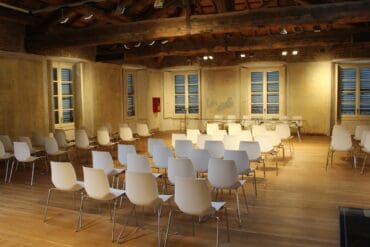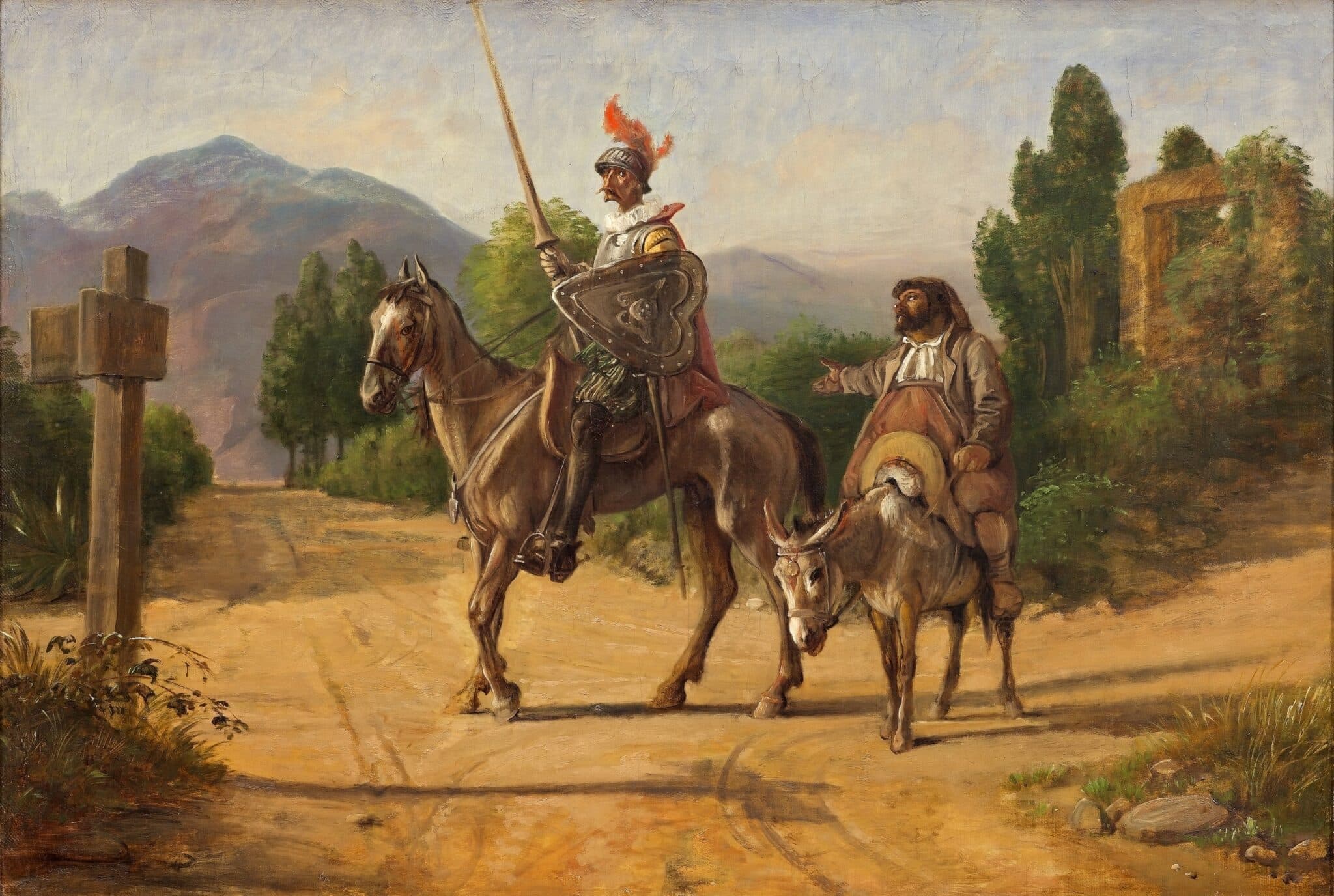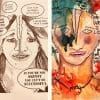Catholic Boy Fights the Devil in the Mohawk River Valley
Author’s Memo
This is a short story that’s set in upstate New York during World War II. At a time when America was fighting fascist devils abroad, many were struggling with the devil’s influence at home. Its inspiration was the senior author’s experience as a child growing up in upstate New York communities around the Adirondack Mountains and Mohawk River Valley. It offers a perspective that allows us to see how much our society has evolved in cultural sophistication in viewing those who do not fit sanitized cultural norms. It leads us to reflecting on what we have gained and lost as our country has become more open to diversity.
The story’s locale is a region that suffered from decades of cultural conflict between the descendants of early Dutch and English Protestant settlers and the later arriving immigrants with Irish Catholic heritage. Their struggles played out in public and sectarian institutions, alike.
The protagonist of this story, an elementary school, Irish-American boy, Daniel, has dyslexia, a learning disability. It has seriously impeded his mastery of the basic literacy skills expected of an American youth by his age. Although both the public and parochial schools he attends conceptualize his problem in different ways, both view him as defective in characterological as well as intellectual terms. Further, the Catholic parochial school he eventually enrolls in regards his difficulty as a spiritual failing.
‘This is a short story that’s set in upstate New York during World War II. At a time when America was fighting fascist devils abroad, many were struggling with the devil’s influence at home.
Since this story takes place during World War II, it marks a time when communities from different ethnic and cultural backgrounds must successfully cooperate to defeat the fascist enemies on both European and Pacific battlefronts. Despite differences in their cultural backgrounds and religious beliefs, most communities in America deeply believe that this call to war is not only a matter of patriotism but, a call to defend godly values. The protagonist’s Catholic working-class family is not conflicted by either the demands of church or country. It unquestioningly accepts its place in the nation and the divine order of things and places the stigma of having an atypical child and the demands associated with raising him on themselves. The problem for them is that their child is personable and can pass for normal outside the scrutiny of an educational setting.
Fortunately for the protagonist, the long-term arc of his development is a constructive one. His personality and supportive family provide him with sufficient resilience to eventually escape to the refuge of New York City where differences of all types are better tolerated. There, he finds a place for himself and builds upon the significant talents that he does have. Yet, the trauma of his childhood experience lingers, fortunately leavened by the kindnesses that he also benefited from. So, on most days, Daniel, as an adult, can effectively live a full life that isn’t overly haunted by the past and is able to honor the positive aspects of his upbringing.

Catholic Boy Fights the Devil in the Mohawk River Valley
I was failing 3rd grade. It was 1942, a year of disasters. Spring was here and we were recovering from what had been a hard, white winter in the area along New York’s Mohawk River Valley, along the southwestern edge of the Adirondacks. The black bears had emerged from hibernation and were beginning to attack the trash cans for edibles to feed a winter’s long hunger. One morning, just after the radio delivered the latest World War II news that Bataan fell, my two-room, country schoolhouse teacher told me I won’t get far because I was unwilling to write with my right hand.
She was a well-built young dark-haired woman in a knit brown dress. Out of great frustration she scolded me in front of the class, “Daniel, if you keep up with your mirror writing, your reward will be failure. This is not good!” I didn’t know for sure what mirror writing meant, but I did know, because of the furtive looks I sneaked at her substantial chest, that something was seriously wrong with me. I was caught like a rat in a trap.

Our across-the-road do-gooder neighbor, a local school board trustee, spoke with me candidly about my writing. He was a stout, bald-headed sort who regularly outfitted himself in suit coat atop bib overalls, capped off with a straw hat. He bore a perspective based upon the serious Protestant ethic that dominated my small rural town. Once he knew I was writing upside down and backwards he began calling me “Dopey.” He was either ahead of his time or saw Snow White, because nobody ever used that form of insult before the movie.
‘One morning, just after the radio delivered the latest World War II news that Bataan fell, my two-room, country schoolhouse teacher told me I won’t get far because I was unwilling to write with my right hand.
One day, after helping him out with farm chores for which I was paid a quarter each week, he cornered me in the barn. Sourly he declared, “Your parents are too good for a wrong-head like you,” He wasn’t the first to say it and I had begun to painfully embrace it as truth. “Unless you change your ways, you’re going to end up in an institution. I guess they’ll put you in a shit-filled stall, like those dopey horses over there.” I didn’t tell my parents what he said. Maybe, I was afraid they might go along with him.
Instead, I went into a months-long depersonalized state that lasted until the beginning of summer. I fell asleep frequently during the day. I suffered through a series of illnesses that included scarlet fever and infected tonsils. I heard my father say to my mother, “That boy is in some kind of decline. Maybe he’s getting dopey.” My mother didn’t disagree. A knife went into my heart.
With summer my energy returned enough to help out on neighboring farms and run around with friends. In mid-August my parents informed me in a “ho-hum” manner that we were relocating 25 miles south to Utica, so that my father, a commercial refrigeration repairman could be closer to his customers, who wanted him at their beck and call. With seven kids in the family, including two babies, they did not have time for much planning.
‘Sourly he declared, “Your parents are too good for a wrong-head like you,” He wasn’t the first to say it and I had begun to painfully embrace it as truth.
The house we moved to was a rental, a Victorian-style, white clapboard three-story affair with a spacious backyard. It was large enough for a sizeable vegetable garden and a chicken coop. Even though it was far bigger than our previous overcrowded quarters, Steven, my older brother, and I continued to be paired up in a shared bedroom furnished with our old bunkbed. Our new location was a safe working-class area. It was not prosperous but comfortable and friendly, so it made sense to follow the advice of our new parish priest and place me in the Irish-dominated Our Lady of Perceptual Help elementary school that was only a four-block walk away.

“Our Lady”, as we called it, was a respected “no crap allowed” parochial school, mainly run by Dominican nuns of Irish extraction, some of whom were recent immigrants from the old country. All were dedicated to extirpating the spiritual demons that they believed still lurked among the descendants of their pioneering ancestors, who left the fatherland to dig the Erie Canal early in the last century. My parents spoke with the Catholic school’s principal, a nun, who assured them that this school and these teachers would help me erase memories of my horrible experience with the Protestants in the country public school.
‘Classes began after Labor Day, I was assigned to repeat third-grade. While embarrassed by that, my classmates treated me with respect.
Classes began after Labor Day, I was assigned to repeat third-grade. While embarrassed by that, my classmates treated me with respect. Although a bit scrawny, I was the tallest kid in the class. Initially, the other kids thought me to have wisdom commensurate with my advanced age. Opening day, I skylarked with the rest of the boys in the schoolyard until the bell clanged. At our classroom door my teacher, Sister Marie, stood like a great wall, scowling with her arms in her black sleeves.
We filed into her classroom with a bleeding Sacred Heart on one side and Gilbert Stuart’s frigid, unfinished George Washington on the other. First came the clean-haired girls, big-eyed and obedient, dressed in their school uniform, a white blouse over navy jumper combination. Then came the boys with the home done buzz cuts, rumpled and mussed, ties yanked and stretched, knicker stockings at full and half-mast, and grass and dirt-stained white dress shirts with shirt tails out. We sat, clasped our hands, and took Sister’s measure, as she took ours.
The Sister, a short, chubby middle-aged woman with a hawk-nosed face, typically held her head cocked slightly forward, which made her look a bit like a mother hen ready to peck her chicks into order. From the sound of her and her few comments, she was Northern Irish-born. Her face, which had more than a dollop of Iberian heritage, was a study in barely controlled fury that leapt out of her immaculate wimple. On bright days, it was difficult to escape the glare of the reflected morning sunlight on her silver-chained crucifix.
‘Early on, Sister Marie was surprised that I could read some and remember. Someone must have told her I was a real dummy.
Early on, Sister Marie was surprised that I could read some and remember. Someone must have told her I was a real dummy. My arithmetic was medium shitty, but my writing was unintelligible, even to me. Sister Marie sighed whenever she saw it.
One morning, a month after the term started, she followed roll call by jabbing her finger at us. “On ya knees. Ya brazen things ya! Ya sit in the seats of the boys of ten classes ago, and ya snicker. This morning, those boys are fighting and dying on the beaches of tiny, faraway Pacific islands. Ya don’t know where they are yet, but ya’ll learn. Kneel for the Second Station of the Cross!”
Rosary beads hung from her waist, like big oiled coffee beans that clicked when she knelt and prayed with us “I confess to Almighty God…”. The prayer had force for us. A few days ago, a neighborhood child, a nice kid in his late teens, died in an Army Air Force B-24 training crash. Just one of the local fallen. All across our city, households with window banners with blue stars on them signifying military service replaced them with the golden banner of loss.
Morning prayer was followed with a half-hour of penmanship lessons. Although I was a natural lefty, Sister insisted that I use my right hand. I could feel the burn from my forearm and wrist muscles at the effort. My small letters looked like fried amoebas, my capitals like tea bags becoming fat sausages. I’d relax a bit when we’d switch to history. I, particularly, enjoyed learning about historical characters such as Prince Henry the Navigator and the early naval explorers.
‘The prayer had force for us. A few days ago, a neighborhood child, a nice kid in his late teens, died in an Army Air Force B-24 training crash.
One day after lunchtime, the Sister asked my friend Charlie with whom I shared a double desk something about a mariner that he only half-remembered and I got caught whispering a reminder into his big pink ear. Glaring at me, she shouted, “On to ya feet! Ya know-it-all thing, ya… tell the class what you know about mariners.”
I got up and recited: “There was an ancient mariner and he stoppeth one of three.” But I really didn’t say it like I had a skinful of lager and bar whiskey in me like I’ve seen so many times at Manskie’s. That would be some time off.
“Go on.” Sister said.
Although that was all I said to Charlie, I went on: “By thy long grey beard and glittering eye, Now wherefore stopp’st thou me?”
“And where pray, did you hear that?” Sister asked.
“From my Dad at Manskie’s”
‘For one to two hours, with drill sergeant intensity and a keen-eyed look on her hawkish face, Sister Marie would have me write with my right hand: “I WILL NOT PERMIT THE DEVIL TO MAKE ME WRITE UPSIDE DOWN AND BACKWARDS”.
The class laughed and stomped. Charlie grabbed at his mouth and fell out of his chair to be hoisted to his feet by Sister’s grip on his ear. “Quiet class. Tell us more, Daniel.”
“Manskie’s on James Street,” I responded.
Ah”, she said, “The Saloon. And what else does your father recite?”
“The Cremation of Sam McGee, Gunga Din, and Anabelle Lee”
“And he wrote them, I guess?”
“No Sister. My Dad and my uncles and their friends, they just say them.”
“Who wrote them?”
“Samuel Coleridge, Robert Service, Ruptured Kipling, Edgar Poe…lots of guys.”
“Yes. Men only. Songs too?”
“Sometimes.”
“What?
“Shoot Me Shoot Me like a Soldier, Do not Hang me Like a Dog.”
“Anything else?”
“Yes, Sister.”
“What?”
“Danny Boy. Some new stuff on the juke box”.
“What?
“Glenn Miller and somebody named Bing Crosby. They like that.”
Then, holding up the handwriting exercise sheet I had completed in the morning, Sister Marie asked, “Is this your penmanship classwork?”
‘Often during the lessons, I struggled not to curse the Sister and scream “leave me alone!” at the top of my lungs.
“Yes, Sister”
“Gibberish! You were delivered to the Protestants before you came here and this is what they had you produce. What do you have to say?”
“My Dad says, ‘Maybe it’s God’s will.’ ”
“It’s not God’s will; it’s the Devil’s. It’s despair!
“Do you know what despair is? …And who broke Jesus’ heart with it?
“Yes, Sister.”
“Well?”
“Disappear is Judas’ sin.”
“Despair! A capital sin that only his priest can deal with it in a mature man. But I’ll tell you what my gossoon: The Devil has walked into my classroom and he has turned your capital letters into obscenities and your handwriting into gibberish and I’m the girl to deal with him. I thought you couldn’t read”
“Sister. I can read some things”
“You read that juke box?”
“Yes, but I can’t read handwriting.”
A few days later when my brother Steven, who was three years older than me, and the hardest worker among us all, dropped off the Observer-Dispatch into the Convent mail slot, he was confronted by Sister Marie. She tucked him under the chin: “Steven, please wait here for a note for your parents.” He knew what that meant. I had screwed up again. I was always getting him involved in my messes. At a distance he heard Sister Marie speaking with Our Lady’s school principal. Steven was gifted that way for he had keen hearing and perfect pitch—he could hear the girls pissing in the toilets outside classrooms and tell you who it was.
‘What kept me cooperating was my fear that if this didn’t work out, I was doomed to be a “stupid shit,” sentenced to a life of failure and rejection.
Once home, Steven excitedly told me: “Holy Jesus, I first thought you stole the offering box. Sister opens the door and all the nuns are there without their collars. Without their bibs, you could see their tits moving around through their blouses!” I heard Sister Marie saying to the principal: “Mirror writing and poor reading is serious. We cannot accept this perversion as God’s will. We all know too well, it’s almost like Belfast in the town where Daniel came from. His Protestant town school put the devil in him. The boy is damaged and needs extra attention. Can I work with him?”
“What the fuck does that mean?” my brother interjected in sympathy.
“Who knows!” I shouted, “What else did she say?”
She said: “I can drive the devil out and make him a literate Catholic gentleman. That’s what we’re here for!”
“She sounded as she were going to bawl at this point,” my brother tossed in as an aside.
Steven showed me the letter for Mom that Sister Marie gave him. “What should we do with it?” I winced at the consequences either way. “Give it to her.”
‘Sister gave him a note for my mother on most days, which read something like: “Your son and I continue to struggle with the Devil. With God’s help, we shall prevail.”
The next afternoon at the end of the regular class, with a half-hour break allowed, four school days a week, Sister Marie convened a school for one on my behalf. For one to two hours, with drill sergeant intensity and a keen-eyed look on her hawkish face, Sister Marie would have me write with my right hand: “I WILL NOT PERMIT THE DEVIL TO MAKE ME WRITE UPSIDE DOWN AND BACKWARDS”. I wrote the “I” correctly, then the rest of the sentence upside down and backwards. Often during the lessons, I struggled not to curse the Sister and scream “leave me alone!” at the top of my lungs. What kept me cooperating was my fear that if this didn’t work out, I was doomed to be a “stupid shit,” sentenced to a life of failure and rejection.
Around 4:30 PM each day, my brother would take a break from his newspaper delivery route and drop by the classroom to cheer me on as I erased my scribble-scrawl from the four black boards for the fifth or sixth time in preparation for more. Sister gave him a note for my mother on most days, which read something like: “Your son and I continue to struggle with the Devil. With God’s help, we shall prevail.” When I left for home on my own, I would occasionally get sidetracked from my obsessive ruminations about whether the torture of these lessons would ever stop by the sights and sounds of the kids I watched leaving scout meetings or finishing off games on the school’s lit playground such as “Keep Away”, and “Wolf Man”.
‘My right hand often cramped up and my arm would ache, but I was getting a few more correct letters in my scribble scrawl. I guess that was my Halloween treat.
One night I passed the McGuiness bungalow on Taylor Avenue. The one on concrete block stilts and with a sizable elm tree that learned starboard toward their bathroom window. Some Cub Scouts from my Troop Two-Twenty had clambered up the tree straining to get a look through the window at 15-year-old Lisa in her bath. Mr. McGuiness, not walking too straight despite the early hour. was out in the yard threatening to get a gun and call their parents if they didn’t get “their stupid arses” out of the tree immediately. I paused for a moment and cursed my luck for missing the fun, then, hurried home, knowing I’d be bawled out if I arrived too late.
That Halloween my lessons did not allow me any time for after school trick or treating or pranks with the guys. My right hand often cramped up and my arm would ache, but I was getting a few more correct letters in my scribble scrawl. I guess that was my Halloween treat.
My progress was far from consistent. One afternoon, I really screwed up my letters. And Sister Marie with a stern look on face, purposefully grabbed my head between her two hands, commanding. “Give yourself over to God!”. Then, firmly twisting my head until my body rotated to face the blackboard. She bent it forward, as if in respectful prayer.
“Bang!’ went my head into the blackboard. Sister Marie recited, “In the name of the Father!”
A second “bang!” followed. Sister Marie recited, “In the name of the son!”
A third “bang!” followed. Sister Marie recited, “In the name of the Holy Ghost!”
“Bang!’ went my head into the blackboard. Sister Marie recited, “In the name of the Father!”
The blows were so hard that it took all my will power not to faint. I admit that did cry. I can still hear the sound of my head slamming into the blackboard.
“Wipe the blood off your nose! Lean your head back and pinch your nostrils tight!” she ordered as she handed me some tissues. “So help me, I fear the devil is going to take me with you.” Her eyes flooded with tears as she instructed, “Let us pray for the Lord’s mercy.” Ten minutes later she had me start my lessons again.
I came home from school late that evening with a deep sense of humiliation over my own stupidity. Maybe, there was a devil inside of me? No one in my family, not even my older brother Steven, or my younger brothers and sisters said anything about my reddened nose or the purple marks on my forehead.
I had missed dinner with my mother and the other kids, but my father joined me. He first served generous portions of creamed codfish, with boiled Paris Hill potatoes and canned peas, drank a beer, and pointed to a newspaper article as I sipped my milk, “Show me how your reading’s coming along, son. Why don’t you read me this story?”. It was way above my reading level, but I struggled bravely and, maybe, got a third of it right.
‘The blows were so hard that it took all my will power not to faint. I admit that did cry. I can still hear the sound of my head slamming into the blackboard.
My father nodded his head encouragingly as if he noticed progress. He said, “You’re coming along, I think it would be a great idea for you to read to your sister Eileen every evening from one of those Golden Books she loves so much.” Golden Books were fairy tale books for young kids with a lot of pictures and some words, perfect entertainment for my 4-year sister. I said with pride, “I’d be glad to do it!”
“Good boy!” my father said while gently stroking my forehead. Then picking up the newspaper her reread the newspaper story to me out loud. It was about the terrible time our marines were having on some island called Guadalcanal. He said, “These are hard times. All of us not in the thick of the battle must be as strong as our soldiers. We must help our country by doing our best at work and in school.” That night we said a rosary for our men at war and for his brother who was over there, someplace in the Pacific.
As the Thanksgiving season rolled in, Sister Marie offered me a gentle admonition as a present, rather than the dire threat of the pit. “Thanksgiving is a Protestant holiday. Do not let your body become occasions of sin. Be strong like Jesus would want you to be.” I was good, but not too good.
I came home from school late that evening with a deep sense of humiliation over my own stupidity. Maybe, there was a devil inside of me?
No such warning accompanied the Christmas school break. By that time, I was doing better with my reading and writing, but was very much afraid to be too hopeful. I developed an occasional and unpredictable nervous tic on the left side of my face. It got worse whenever I thought about my afterschool lessons. It started off feeling like a little bug was crawling on my face, an inch above my left lip. And then, the sensation quickly traveled up to my eye. At that point my whole left cheek would twitch once or twice along with eyeblinks. I wondered if this was sign of the struggle that was going on for my soul.
My father told me it would disappear on its own when I was a bit older. He suggested that if it bothered me then, a quick shot of rye would do the trick. My mother, who rarely had time to spend with me since the babies came, didn’t like the shot of rye solution. Rather, she instructed me thinking “good thoughts” about the Virgin Mother when this “pesky thing” appeared and that would be the fix, and, indeed, that did help a bit. Mainly, I decided, that if the situation didn’t get better at school, I would hop on one of the many freight trains that run through our town and join the hobos, so that my family would no longer have the disgrace of living with me.
‘ My father told me it would disappear on its own when I was a bit older.
Fortunately, I was able to be distracted by my growing morbid turn of mind by my parents attempts to make the holidays a bright time for everyone. That year we had a Christmas tree with oranges and popcorn balls on it. One Aunt brought a great tray of frosted brownies. Aunt Maggie, my mom’s sister, ran herself into debt to make sure we each got a present. Another Aunt on my father’s side brought two quarts of oysters up from New York.
Her husband, a New York Central Conductor, brought up a couple of quarts of whiskey. Soon after his arrival, already imbibing a large portion of the hard stuff, he urged me, “Daniel, you got the voice in the family, lead us in some carols,”. My mother then gave everyone printed sheets with the family’s favorites. I knew most of them by heart, but it was surprising for me I could now read most of them.
The cold blue early evening of February 16, 1943 is a moment I regard almost as important as my birthdate for I’d made no mistakes in my afterschool drills. Sister looked at the blackboard under Washington’s full visage at my right side up and now almost legible handwriting. She sighed and had me kneel beside her. We prayed a little. She stood me up and brushed some chalk dust off my clothes. You can go home Daniel. God has answered our prayers.”
‘I felt literally and spiritually saved by her words. I was no longer outwardly defective. Of course, the inner wounds from this “education as spiritual healing and exorcism” ran deep and while the positive effects of the intervention were durable, there were lingering scars, some of which remain tender to mental touch and some of which are triumphant personal symbols of my own conquest over unknown and known demons.
“Thank you, Sister,” I said.
I felt literally and spiritually saved by her words. I was no longer outwardly defective. Of course, the inner wounds from this “education as spiritual healing and exorcism” ran deep. While the positive effects of the intervention were durable, there were lingering scars. Some of them remain tender to mental touch and some of them are triumphant personal symbols of my own conquest over unknown and known demons.
So here I am today, 34 years later. I sit reviewing an exceptionally sad day in my life. It is the night of my father’s funeral and I am pouring my thoughts into my written journal using a pen held in my left hand. As I write, the facial tic that first appeared during my afterschool writing lessons re-emerges for the first time in a decade. At first, I laugh a bit to myself, thinking that the devil may still lurk in me. Then, I try the relaxation exercises that my psychotherapist taught me to vanish it, but when that didn’t work, I honor my father’s advice with a warming shot of cognac, always a quick and easy solution.
As I write, the facial tic that first appeared during my afterschool writing lessons re-emerges for the first time in a decade. At first, I laugh a bit to myself, thinking that the devil may still lurk in me.
My father’s death was hard on him and us, as is the loss of him. Near the end of the wake earlier today, when our family returned from drinking some whiskey to the funeral parlor and we were lost in a stuporous state of grief, my mother called me to the coffin to meet a bloated, elderly gray-haired nun with wire-rimmed glasses resting on a large hawk-like nose and a knowing look. For support, she stood with her arm resting on the coffin; in a rather Kate Smith “at-the-piano” pose, waiting for her respectful and honorary kiss.
Then, I try the relaxation exercises that my psychotherapist taught me to vanish it.
I didn’t recognize her after all these years, but it was Sister Marie. She introduced herself and said, “Your father was a good man. God will welcome him into heaven. He really cared about your education. I hear you’re now a social worker with a doctorate, and have a Jewish wife, and two children. You were such a hard-head kid…but, praise Jesus, we broke you. We broke you!”
My outward response was only a bittersweet smile. My thought, “Yes and no.”
Of course, the inner wounds from this “education as spiritual healing and exorcism” ran deep. While the positive effects of the intervention were durable, there were lingering scars.
Credits
Photo around Mohawk by Hans İsaacson for Unsplash
Photo of Adirondacksc by Kurt Von for Unsplash
Victorian House by StillWorksImagery for Pixabay
Featured image by Bhanuka Dilshan for Unsplash
Learn More
New to autoethnography? Visit What Is Autoethnography? How Can I Learn More? to learn about autoethnographic writing and expressive arts. Interested in contributing? Then, view our editorial board’s What Do Editors Look for When Reviewing Evocative Autoethnographic Work?. Accordingly, check out our Submissions page. View Our Team in order to learn about our editorial board. Please see our Work with Us page to learn about volunteering at The AutoEthnographer. Visit Scholarships to learn about our annual student scholarship competition.













